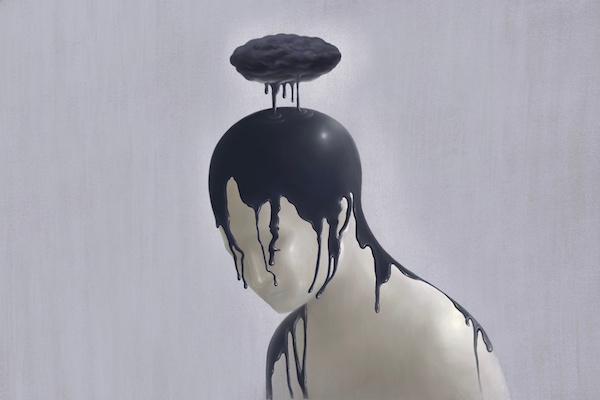A Natural Cure for Depression
Potatoes for Breakfast, Then a Vigorous Very Early Morning Walk in the Sunshine
Aldous Huxley in his (1932) novel, Brave New World, and George Orwell in his (1949) classic book, 1984, predicted a future population of people “high” on mood-enhancing drugs. The future is now. More than $8 billion annually in the USA, and $12 billion worldwide, are spent by millions of people trying to improve their unhappy lives with antidepressant medications. In my personal experience, I have seen in some of my clinical settings as many as 40% of my middle-aged female patients on these drugs.
Many of us, older than forty, remember a time when our friends and relatives were not under the influence of doctor-prescribed, mind-altering drugs. So what was different then? Some will argue that life is more difficult now than in the past – I doubt that. The Great Depression spanning the 1930s and World War II in Western Europe are two recent examples of times of suffering far greater than most of us have ever experienced.
There are tangible reasons for this epidemic of antidepressant-pill-prescribing that are as familiar to you as your comfortable bed, your easy chair, and your neighborhood fast-food restaurant. People now suffer, physically and mentally, from the worst health ever known to our species – due to our diet and lifestyles. And because of improved sanitation, immunizations, and antibiotics, that have virtually eliminated the threat of death from infectious diseases, we now live longer in this miserable state of sickness.
The distinction between pain in the mind and in the body is blurred – people are desperately searching for relief, even when that means changing their minds with medication. Feeding off the misery of the suffering masses are the pharmaceutical companies providing drugs for almost everything except for the elimination of the underlying causes of the sickness. Mental “health” is a heavily-exploited share of their marketplace.
Life is Difficult
In this article I am not trying to say all of your mental anguishes are so simply solved by behaviors you can control. My position is, just don’t compound your mental and emotional (as well as physical) well-being with unwise diet and lifestyle choices. After almost 50 years as a doctor caring for patients I have come to know thousands of people personally. My conclusion is that most of us have similar problems. We have money worries, unfulfilled goals and difficulty getting along with others. But we make it through the day by putting one foot in front of the other (as marching soldiers say). In fact, I believe these difficulties are necessary to have a productive and fulfilling life – They provide for challenge and adventure. Unfortunately, too many healthy people misinterpret their normal reactions to daily difficulties as “mental illness” in need of a tranquilizer or antidepressant – and life becomes anesthetized (numbed). You deserve better.
Also, I recognize that there are a relatively small number of people who suffer serious mental illnesses – whose lives are greatly benefitted by SSRI antidepressants and other antipsychotic medications. But, today overprescribing and overuse of mild-altering drugs are doing far more harm than good in our society.
Following the introduction in 1988 of Prozac, intense marketing by drug companies – initially to doctors and now directly to consumers – has convinced millions of people they are mentally ill and “in need” of antidepressant medication. Understating the problem, antidepressants have become too popular and physicians are too casual about prescribing them, especially to people with mild symptoms. But this trend may change as knowledge of serious side effects becomes more widespread.
On Monday, March 22, 2004, the US Food and Drug Administration regulators warned that patients taking antidepressants can become suicidal, especially during the first weeks of therapy, and physicians should monitor patients closely when first giving the drugs or changing dosages. Children seem to be especially affected by the increased tendencies for depression, agitation, and suicide from these drugs. Hopefully, this new publicity will cause people to ask about ways to avoid becoming dependent upon these drugs, and most importantly, ways to naturally correct the causes of their depressed mental health.
SSRI Antidepressants
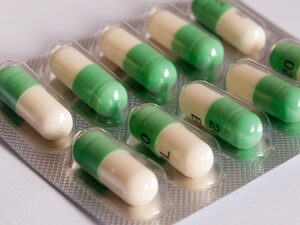 The commonly prescribed antidepressants are called selective serotonin reuptake inhibitors (SSRI) and include: Prozac, Zoloft, Paxil, Luvox, Celexa, Effexor, Serzone and Remeron. These drugs work by preventing the removal and degradation of neurochemical, serotonin, from the nervous system – thus higher serotonin activity persists. This natural brain chemical (serotonin) acts to suppress appetite, relieve depression and mute stimulation from outside sources. Common side effects of these drugs also include ejaculatory failure, loss of libido, dry mouth, sweating, diarrhea, nausea, fatigue and insomnia.
The commonly prescribed antidepressants are called selective serotonin reuptake inhibitors (SSRI) and include: Prozac, Zoloft, Paxil, Luvox, Celexa, Effexor, Serzone and Remeron. These drugs work by preventing the removal and degradation of neurochemical, serotonin, from the nervous system – thus higher serotonin activity persists. This natural brain chemical (serotonin) acts to suppress appetite, relieve depression and mute stimulation from outside sources. Common side effects of these drugs also include ejaculatory failure, loss of libido, dry mouth, sweating, diarrhea, nausea, fatigue and insomnia.
You will soon learn that serotonin activities in your nervous system are effectively and safely enhanced by sleep control, sunlight diet and exercise – cost-free, non-toxic therapies.
Overnight Relief of Depression Safe Serotonin Solution One
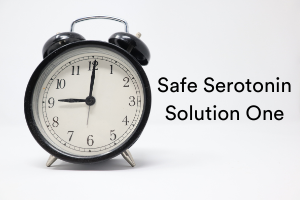 The solutions for the causes of depression are within everyone’s reach – and the most powerful one is no more difficult than setting your alarm clock. A single night of total or partial sleep deprivation, called “wake therapy,” induces rapid and dramatic improvement of mood in about 60% of all depressed patients, independent of the kind of depression the person suffers.1,2 This treatment was discovered almost 35 years ago when deeply depressed, psychotic, often suicidal patients were found to be transformed into their “normal” selves within a few hours of staying awake. Men and women respond equally well. The likelihood of benefiting from this non-toxic, self-administered approach is not related to age, previous hospitalizations, nor duration or severity of depression. People with bipolar (manic-depressive) disorder, schizophrenia, premenstrual depression, and the common variety “blues” all respond. Even patients who believe that lack of sleep is central to the cause of their depression are dramatically benefited by “wake therapy.”
The solutions for the causes of depression are within everyone’s reach – and the most powerful one is no more difficult than setting your alarm clock. A single night of total or partial sleep deprivation, called “wake therapy,” induces rapid and dramatic improvement of mood in about 60% of all depressed patients, independent of the kind of depression the person suffers.1,2 This treatment was discovered almost 35 years ago when deeply depressed, psychotic, often suicidal patients were found to be transformed into their “normal” selves within a few hours of staying awake. Men and women respond equally well. The likelihood of benefiting from this non-toxic, self-administered approach is not related to age, previous hospitalizations, nor duration or severity of depression. People with bipolar (manic-depressive) disorder, schizophrenia, premenstrual depression, and the common variety “blues” all respond. Even patients who believe that lack of sleep is central to the cause of their depression are dramatically benefited by “wake therapy.”
The best responses are found with people who have large day-to-day variability of mood. People are more likely to respond to sleep deprivation when they have a history of feeling worse in the morning, then gradually becoming freer of their symptoms as evening approaches – as the “depressant effects” of the previous night’s sleep wear off through the wakeful hours of the day.
Because sleep causes depression it is referred to as “depressogenic” in the psychology literature. Wakefulness is “antidepressogenic.” The underlying chemical basis for this phenomenon may be serotonin. Serotonin activity is maximum during the awake state and minimum during sleep.3 (Notice this rise in serotonin activity is similar to the one caused by the SSRI medications discussed above.)
Sleep deprivation can be used as a diagnostic tool.4 Sometimes depression and dementia are confused in elderly people. These older people appear to be losing their intellect when actually their dulled response is a result of depression. Older people tend to sleep more because of lack of outside interests. A common scenario is for an active person to retire from many years of productive employment, and then he finds little else to fill his time except to sleep more often. Depression soon follows with more hours of nighttime sleep and daily naps. Then he is off to the doctor to be put on antidepressants, which can cause him to sleep more, thus worsening one of the underlying causes of his depression. Thus, the despondent elderly are some of the best candidates for “wake-therapy.” Getting them back to their “old schedule” can put them quickly back to their “old selves.”
Elevation in mood by controlling sleep is not limited to people who are severely depressed – studies have reported elevation of mood in “normal” subjects who sleep less.5 With this in mind, manipulation of sleeping behavior has the potential of freeing most people of antidepressant medications and offering them an emotionally more satisfying life – providing personal control over their frame of mind.
The most serious side effect of sleep deprivation is that the mood swing can become too much – causing mania.6 You may recall from your own life a time when you went without sleep for days – during college exams or a demanding project – a time when you probably became giddy, if not outright manic! Thus, avoidance of sleep disturbances and more hours of sleep may be helpful for people who suffer from mania. Sleepiness and tiredness are also expected side effects from “wake therapy.” Caution when driving and using dangerous machinery must be exercised.
How Much Sleep is Enough
 From childhood we are taught that sleep is good for us – the more the better – a minimum of 8 hours a night, even for healthy adults. These assertions are reinforced by the relief from pain and worry, and the refreshment derived from “a good night’s sleep” Young people need more sleep than adults. A newborn baby may spend half to three-fourths of its day asleep. Children may need 8 to 10 hours to replenish themselves. Pregnancy temporarily increases the need for rest; and during times of illness, sleep and rest may be helpful, perhaps required, for recovery. However, in adulthood, 8 hours a night is usually too much sleep for most people. Many of us actually feel and function best on 5,6 or 7 hours a night. Some people do well on less than 5 hours a night. As we age sleep requirements become less; some seniors may rest comfortably for only three or four hours a night – and that state is normal (not requiring sleeping pills or antidepressants).
From childhood we are taught that sleep is good for us – the more the better – a minimum of 8 hours a night, even for healthy adults. These assertions are reinforced by the relief from pain and worry, and the refreshment derived from “a good night’s sleep” Young people need more sleep than adults. A newborn baby may spend half to three-fourths of its day asleep. Children may need 8 to 10 hours to replenish themselves. Pregnancy temporarily increases the need for rest; and during times of illness, sleep and rest may be helpful, perhaps required, for recovery. However, in adulthood, 8 hours a night is usually too much sleep for most people. Many of us actually feel and function best on 5,6 or 7 hours a night. Some people do well on less than 5 hours a night. As we age sleep requirements become less; some seniors may rest comfortably for only three or four hours a night – and that state is normal (not requiring sleeping pills or antidepressants).
Practical Sleep Management
For people in great need of immediate relief from depression, total sleep deprivation, accomplished by staying up all night, may be the most effective technique. However, for long-term results partial deprivation is more practical and as effective as total sleep deprivation for relieving depression for most people.7 Sleep management can be self-tailored to meet the needs of the individual and utilized on an “as needed” basis. The “right amount” of sleep for you will be determined by trial and error – closely observing your own response to sleep.
Find the right balance between fatigue, which needs to be relieved by adequate rest, and your mood, which can be depressed by too much sleep. If you are depressed now, then your first step can be to cut 1 to 2 hours off your allotted time to sleep. You will need to allow time for your body to adjust – expect to feel fatigued for a day or two, but also expect elevation of your mood to start after a night or two of following your new schedule. Add or subtract half hour intervals of sleep based on your mood and your fatigue level.
For some people, improvement after sleep deprivation can last for several weeks. With relapse the treatment is simply repeated. With other people one full night’s sleep may result in a complete relapse of symptoms. Some patients are so sensitive to the depressing effects of sleep that they relapse even after a short, 2 to 15 minute, nap.
Morning may be the best hours to apply “wake therapy,” – in other words, set your alarm to wake up early. These hours are especially beneficial because early rising fits well into our natural sleep-wake cycle set by the movement of the sun (our circadian cycle). Most people sleep away these valuable hours just after dawn, missing the added benefits of ultraviolet light for their mental health.8 Exposing your eyes to these additional morning hours of sunlight can cause profound improvements in the chemistry of your brain; curing depression.
Curing Insomnia Too
One of the most common complaints I hear from people is “I can’t sleep.” In addition to causing depression, sleeping more than necessary commonly causes insomnia. For one or two nights you might get the 8 to 10 hours you think you need – then your “batteries” are overcharged and you remain awake for much of the third night – as your body tries to adjust to your efforts to over-rest it. Therefore, as intuitive and simplistic as the solution of sleeping less may sound, this approach will cure insomnia – and give you additional hours to enjoy your life.
The Sun Will Make You Shine
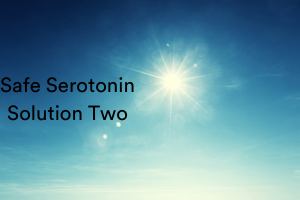 Most of us can identify with the typical winter depression symptoms of fatigue, lowered motivation, sleepiness, fatigue, increased appetite, weight gain, irritability, and decreased sociability. This common condition is usually referred to as Seasonal Affective Disorder (SAD) – punctuated by depressions in winter months with a remission the following spring or summer.9 Brain chemicals called neurotransmitters – such as serotonin – may be at the root of this disorder.10The natural solution is to get more sunlight exposure by spending more daylight hours outside where you now live – or for some people, relocating out of a wintery, cloudy climate to the desert or a tropical island will do just fine.
Most of us can identify with the typical winter depression symptoms of fatigue, lowered motivation, sleepiness, fatigue, increased appetite, weight gain, irritability, and decreased sociability. This common condition is usually referred to as Seasonal Affective Disorder (SAD) – punctuated by depressions in winter months with a remission the following spring or summer.9 Brain chemicals called neurotransmitters – such as serotonin – may be at the root of this disorder.10The natural solution is to get more sunlight exposure by spending more daylight hours outside where you now live – or for some people, relocating out of a wintery, cloudy climate to the desert or a tropical island will do just fine.
There are also artificial sunlight therapies. In classical light therapy, the SAD sufferer sits in front of a light box, and is exposed to 2000-10,000 lux for 30 to 120 minutes daily during the winter.9 Light therapy works for both SAD and non-seasonal depression. Light therapy results in a rapid onset of antidepressant action – benefits are noticed within days. Furthermore, it can prevent relapses of depression after “wake therapy.”
Correct Depression-Causing Malnutrition
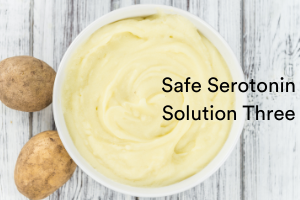 Twenty percent of your daily caloric intake goes to nourish your brain. The preferred fuel of this thinking organ is carbohydrate – more specifically, glucose is the main metabolic fuel of the brain. The average Westerner is on a carbohydrate deficient diet – with 40% or less of his calories coming from carbohydrates, when 70% or more would be ideal. Matters are made even worse for those unfortunate people following the popular low-carbohydrate diet craze (Atkins, South Beach, Protein Power, Keto etc.) – resulting in intakes of 10% or less of calories from brain-fueling carbohydrates.
Twenty percent of your daily caloric intake goes to nourish your brain. The preferred fuel of this thinking organ is carbohydrate – more specifically, glucose is the main metabolic fuel of the brain. The average Westerner is on a carbohydrate deficient diet – with 40% or less of his calories coming from carbohydrates, when 70% or more would be ideal. Matters are made even worse for those unfortunate people following the popular low-carbohydrate diet craze (Atkins, South Beach, Protein Power, Keto etc.) – resulting in intakes of 10% or less of calories from brain-fueling carbohydrates.
No wonder people on the Atkins diet have been found to have impaired brain function, which may be primarily due to the lack of carbohydrate or to the depressed levels of the depression-relieving neurochemical, serotonin, in their brains, caused by this diet.11,12 Carbohydrates from your diet raise serotonin levels naturally, and as a result, they effectively act like a natural tranquilizer, relieving depression, and improving mood.13,14 High carbohydrate intakes have been found to improve the moods of people, particularly athletes, who are known to eat very high-carbohydrate, near-vegetarian, diets.15 Notice again the similarity of activity with the popular antidepressant medications discussed above (SSRI) – they work by raising serotonin levels – something that would be unnecessary if people followed a high-carbohydrate diet.
People following a high-carbohydrate diet also report less time spent sleeping, more restful sleep, and an increase in dream activity. (Less sleep means less depression, as discussed above. See how diet and lifestyle changes all work together to enhance each other’s effects.) An increase in rapid eye movement (REM) sleep has been observed with an electroencephalogram when subjects are switched to a high-carbohydrate, low-fat diet.16 REM activity is associated with increased body activity during sleep and dreaming – signs of more effective sleep.
Exercise for a Natural High
 More exercise is the common sense answer for how to fill the extra time you now have from using “wake therapy” and how to satisfy your requirement for exposure to additional sunlight. And no surprise, the high-carbohydrate diet you now follow supplies the ideal fuel for all that extra activity – all serious endurance athletes know the winning benefits from loading up on carbohydrates daily (See my September 2003 Newsletter article “Building Your Own High-Performance Athletic Body.”)
More exercise is the common sense answer for how to fill the extra time you now have from using “wake therapy” and how to satisfy your requirement for exposure to additional sunlight. And no surprise, the high-carbohydrate diet you now follow supplies the ideal fuel for all that extra activity – all serious endurance athletes know the winning benefits from loading up on carbohydrates daily (See my September 2003 Newsletter article “Building Your Own High-Performance Athletic Body.”)
Exercise has been found to increase hormone activities in the body associated with an improved mood and increases the body’s sensitivity to serotonin.17-19 In one recent study of elderly people, after 16 weeks of treatment, exercise was found to be equally as effective as medications in reducing depression among those suffering from major depressive disorders.20
Improved Health and Self-image Complete the Depression Cure
Following a healthy diet and lifestyle with the right amount of sleep, sunshine and exercise leads to the final component necessary for lasting mental health, which is excellent physical health. People who are overweight and physically ill are often mentally ill, as well. To themselves, their condition appears hopeless – a future of increasing pain and progressive immobility; with relentless deterioration until a premature death. Obviously, one look in the mirror and/or the medicine cabinet is enough to depress most people who follow the Western diet. This dilemma is solved by the right diet and lifestyle choices.
Compounding their problems of physical illness and obesity are the common side effects, including depression, of medications used to treat these dietary diseases (high blood pressure, heart disease, diabetes, etc.). One notorious example is from a frequently prescribed class of blood pressure medication known as calcium channel blockers – they have been found to increase the relative risk of suicide among users by 5.4 times compared to non-users.21
Cost-free Relief, Yet Largely Ignored
By now you should have a clear understanding of the central role that neurochemicals, especially serotonin, play in our mood – and that all aspects of a healthy diet and lifestyle safely enhance serotonin activity resulting in a condition of well-being and happiness.22 The pharmaceutical industry has been trying to replicate these benefits with their antidepressant medications – but as with all drug therapies the benefits fall short of the expectations, are expensive, and always have serious side effects.
Wake therapy, light therapy, diet and exercise cannot be patented, and they will not bring profits to the medical or pharmacological industries, but they can help the patient in a shorter time and with fewer side effects than drugs. Considering the psychological suffering that depression inflicts – including ruined lives, destruction of families, homicide, and suicide – and the financial burdens placed on our healthcare systems – it is surprising how little notice is taken of these remarkable non-toxic therapies.
Possibly the adverse side-effects and the exorbitant costs of these antidepressant medications will soon cause more people to take a second look at the alternative – highly effective, rapid-onset, self-controlled, self-prescribed, cost-free, well-tolerated, and non-toxic approaches of diet and lifestyle. Unfortunately, because these tools are also non-profit they are likely to achieve popularity in only a small select segment of the population – those of us interested enough in a good life to put out the effort to discover correct information, and then take proper actions to care for ourselves and our families.
References:
1) Wirz-Justice A. Sleep deprivation in depression: what do we know, where do we go?
Biol Psychiatry. 1999 Aug 15;46(4):445-53.
2) Giedke H. Therapeutic use of sleep deprivation in depression. Sleep Med Rev. 2002 Oct;6(5):361-77.
3) Adrien J. Neurobiological bases for the relation between sleep and depression.
Sleep Med Rev. 2002 Oct;6(5):341-51.
4) Letemendia FJ. Diagnostic applications of sleep deprivation. Can J Psychiatry. 1986 Nov;31(8):731-6.
5) Wu JC. The biological basis of an antidepressant response to sleep deprivation and relapse: review and hypothesis. Am J Psychiatry. 1990 Jan;147(1):14-21.
6) Wehr TA. Improvement of depression and triggering of mania by sleep deprivation. JAMA. 1992 Jan 22-29;267(4):548-51.
7) Leibenluft E. Is sleep deprivation useful in the treatment of depression? Am J Psychiatry. 1992 Feb;149(2):159-68.
8) Eagles JM. Seasonal affective disorder. Br J Psychiatry. 2003 Feb;182:174-6.
9) Magnusson A. Seasonal affective disorder: an overview. Chronobiol Int. 2003 Mar;20(2):189-207.
10) Hoekstra R. Effect of light therapy on biopterin, neopterin and tryptophan in patients with seasonal affective disorder. Psychiatry Res. 2003 Aug 30;120(1):37-42.
11) Wing RR. Cognitive effects of ketogenic weight-reducing diets. Int J Obes Relat Metab Disord. 1995 Nov;19(11):811-6.
12) Zhao Q. Detrimental effects of the ketogenic diet on cognitive function in rats.
Pediatr Res. 2004 Mar;55(3):498-506. Epub 2004 Jan 07.
13) Wurtman RJ. Brain serotonin, carbohydrate-craving, obesity and depression.
Obes Res. 1995 Nov;3 Suppl 4:477S-480S.
14) Wurtman RJ. Effects of normal meals rich in carbohydrates or proteins on plasma tryptophan and tyrosine ratios. Am J Clin Nutr. 2003 Jan;77(1):128-32.
15) Achten J. Higher dietary carbohydrate content during intensified running training results in better maintenance of performance and mood state. J Appl Physiol. 2004 Apr;96(4):1331-40. Epub 2003 Dec 05.
16) Phillips F. Isocaloric diet changes and electroencephalographic sleep. Lancet. 1975 Oct 18;2(7938):723-5.
17) Lane AM. The effects of exercise on mood changes: the moderating effect of depressed mood. J Sports Med Phys Fitness. 2001 Dec;41(4):539-45.
18) Dimeo F. Benefits from aerobic exercise in patients with major depression: a pilot study. Br J Sports Med. 2001 Apr;35(2):114-7.
19) Dey S. Physical exercise as a novel antidepressant agent: possible role of serotonin receptor subtypes. Physiol Behav. 1994 Feb;55(2):323-9.
20) Blumenthal JA. Effects of exercise training on older patients with major depression.
Arch Intern Med. 1999 Oct 25;159(19):2349-56.
21) Lindberg G. Use of calcium channel blockers and risk of suicide: ecological findings confirmed in population based cohort study. BMJ. 1998 Mar 7;316(7133):741-5.
22) Brambilla . GABAergic dysfunction in mood disorders. Mol Psychiatry. 2003 Aug;8(8):721-37, 715.
Recommended Articles

Do You Know How Many Calories Are in the Food You Eat?

When Friends Ask: Why Do You Avoid Adding Vegetable Oils?







